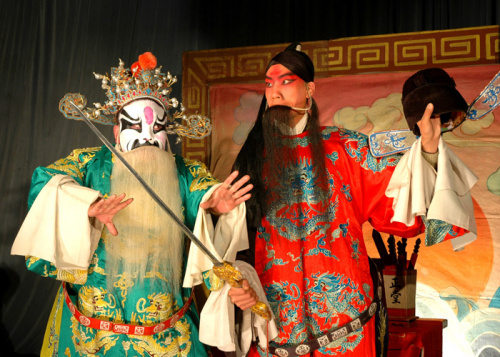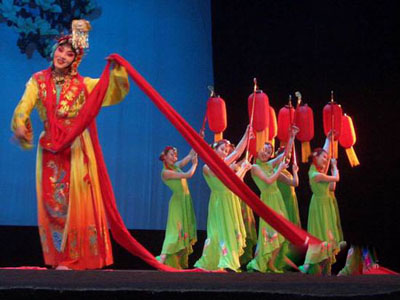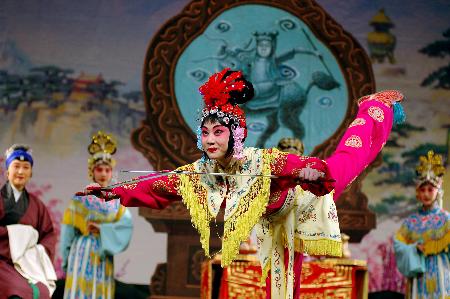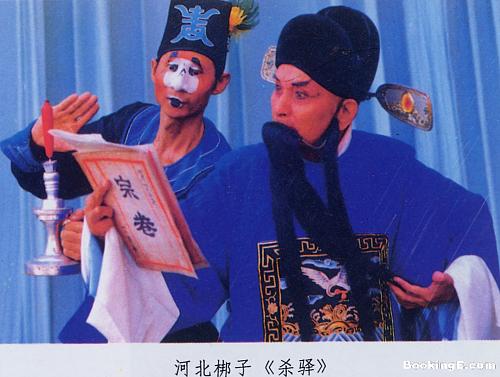
Hebei Clapper Opera is the main type of drama in Hebei province. In the past it was called Jing Wooden Clapper Opera, Zhili Wooden Clapper Opera and Wei (referring to Tianjinwei) Wooden Clapper Opera before it adopted the official name of Hebei Clapper Opera in 1952. It is popular in Beijing, Tianjin, Hebei, Jilin, Liaoning, Heilongjiang, Inner Mongolia, and Shandong.

The history of Hebei clapper opera - it came into being in the early 19th century and at its most popular, was performed on the same stage with Peking Opera, thus adopting also the repertoire of Peking Opera apart from the more traditional Shanxi and Shenxi Clapper Operas repertoire. Hebei Bangzi is derived from Qinqiang and Shanxi Bangzi operas, which were introduced to Hebei province in the middle of the Qing Dynasty. Singing in Beijing dialect, its division of roles and its performance style are similar to Peking Opera.
The features of Hebei Clapper Opera--Musical patterns of Hebei Clapper Opera include five rhythmic structures. The accompanying instruments are the banhu, two-stringed Chinese fiddle: dizi, horizontal bamboo flute: sheng, mouth organ, and percussion. The Hebei Bangzi repertoire has more than 500 traditional and 200 contemporary plays.

Xusheng, a man with whiskers, plays the leading male role and his singing style is forceful and solemn. The Qingyi female role emphasizes loud, clear singing, and the Huadan female role stresses acting and dialogue. Songs in the Hualian male role are performed with a painted face, and are rustic and vigorous. Hebei Bangzi has a special acting role, the Jingsheng, which combines Sheng costumes, Jing tunes and the performance styles of both Jing and Sheng.
Some famous plays of hebei clapper opera--if you want to know more about Hebei Clapper Opera, you can watch some famous plays, such as Butterfly Cup, the (Hudie Bei) Magic Lotus Lantern, the (Baoliandeng) Unwilling Concubine, the (Chen Sanliang).

Butterfly Cup, the (Hudie Bei): Tian Yuchuana, son of a county magistrate, accidentally kills the governor's son who has beaten a fisherman to death. The fisherman's daughter, Hu Fenglian, immediately hides Tian from the police in the ship's hold. Tian falls in love with Hu and gives her a butterfly cup as a keepsake. Then, Hu goes to the county officials to have the the governor's son charged for killing her father. The county magistrate also argues on her behalf. In the end, the case is left unsettled.
Magic Lotus Lantern, the (Baoliandeng): The Goddess of Mount Hua, who helps people with her magic Lotus Lantern, falls in love with a mortal, Liu Yanchang. They get married and have a son named Chen Xiang. But the goddess's brother cannot bear to see his sister marry a mortal. He orders his heavenly dog to steal away the Lotus Lantern and hide the goddess in Mount Hua. Later an immortal teaches Chen Xiang martial arts so he can split Mount Hua open and save his mother.
Unwilling Concubine, the (Chen Sanliang): Chen Sanliang, a prostitute, is sold to a rich merchant as a concubine. Because Chen refuses to go with him, the merchant charges her in Cangzhou court, where the corrupt governor cruelly tortures her. It so happens that the emperor commands Chen Kui, the Number One Scholar, to inspect Cangzhou. Chen Kui saves Chen Sanliang and punishes the governor. |